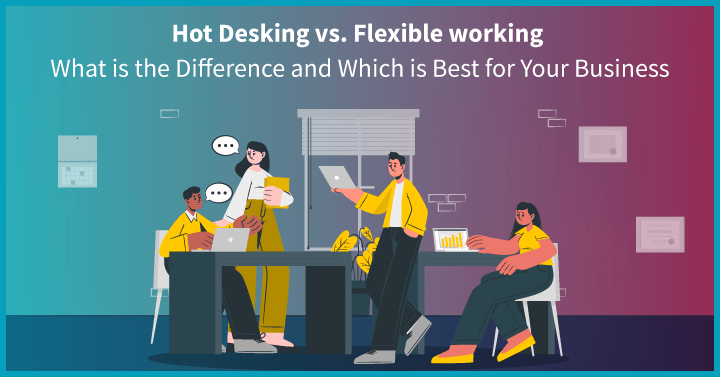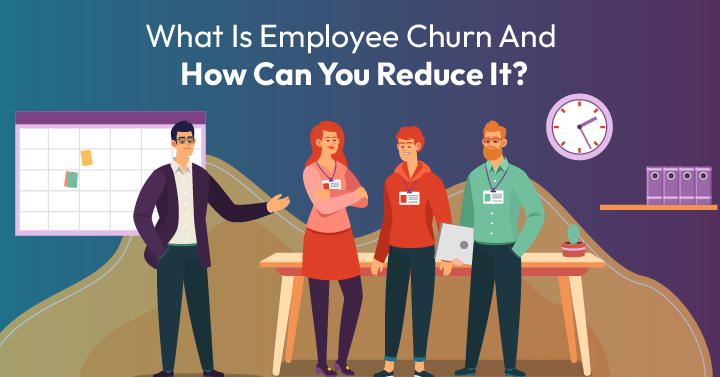With so many new work models such as hot desking, hoteling and flexible working that are coming up to meet the dynamics of remote and hybrid work, it can be pretty confusing to figure out which one suits an organization or an employee. In a comparison for hot desking vs flexible working, there were several pros and cons that factored in.
Read on to gain more clarity on what hot desking vs flexible working entails so you can make a more well-informed decision.
1. What Is Hot Desking?
Hot desking is a process that can be used to book work areas or desk spaces in an office for a specific time duration as and when needed. These workspaces are not permanently allocated to employees and are booked on a first-come, first-served basis. The bookings however can be modified to handle adhoc changes in requests.
2. Benefits and Challenges of Hot Desking

The benefits of hot desking:
Since hotdesking works on quick turnaround, it’s a great option in case of ad hoc work or sudden emergencies. Ran out of printer paper and you need to take a printout? Sudden decisions to have an in-person meet at the office? Had a client who gave you two hours for a quick assignment while you were at a cafe? Simply hot desk yourself into an office space so you can get cracking. This is also a great choice for part-timers or freelancers, and employees who may be on-the-go and still need to use a desk or work space on a temporary basis.
Hot desking promotes more productivity in an indirect way. Since desk spaces are not permanently allocated to just one individual, users are not encouraged to grow roots. This means you need to avoid clutter and keep your desk neat and tidy for the next user to take over. With a more organized space to operate from, you can work more productively and focus on multiple tasks more efficiently.
A major attraction for hot desking is the freedom it gives you to work on your own terms when it comes to seating and time zones. This also goes a long way in promoting accountability and boosting productivity.
The challenges of hot desking are:
With shorter turnarounds, you can access and book only whatever is available in terms of unoccupied spaces. This could mean you may end up in a spot that’s too noisy or crowded for comfort especially if you need the quiet to work on something important or deadline-oriented.
With a mixed crowd of workers, it’s not the best option to have a desk space when you might be dealing with sensitive or confidential information. With the potential for data theft, misplaced documents or hacking, you need to be extra vigilant when working in a hot desking space.
Since you do not have a choice in the kind of desk you get, you cannot be sure about the state of its cleanliness. On any given day, with over eight to ten users for one desk on an average, there's an increased risk of exposure to bacteria or germs. Your safest bet is to ensure that the facility or center follows strict hygiene and Covid protocols so one can work in a safe and healthy environment.
If you are someone who prefers to work in a certain environment and any change to that affects your focus or ability to work, then reconsider hot desking. Simple factors such as noise, temperature control, adequate lighting and all can be fixed for all in a hot desking environment which means you cannot personalize your space and that may in turn impact productivity levels.
3. What Is Flexible Working?
Unlike hotdesking or hoteling, flexible working is more of a mutually agreed arrangement between a company and employees with regard to the workplace, working hours or work-from-home pattern. This is more of an exclusive approach taken on the basis of type of work done, the kind of employees who need it or can use it. Interestingly, flexible working can be merged with hot desking or hoteling if needed.
4. Benefits and Challenges of Flexible Working

The benefits of flexible working are:
Employees can maintain a healthy work-life balance instead of doing the tightrope act. With more time to work around personal schedules be it yoga classes, PTMs, community care etc., employees can take care of themselves and others around, complete other relevant work and end up more relaxed. Despite tight schedules, they now have the flexibility to plan and schedule work accordingly so they don’t feel overwhelmed or have clouded judgment to make important work decisions This reduces the chances of burnout while upping the quality of work being. With flexibility in hours, employees can fine-tune body clock or peak performance time zone and use that to their advantage. Whether they prefer to be early birds or night owls, it ideally boils down to getting work done efficiently and on time.
One of the biggest pet peeves on a day to work is traffic and the grind of daily commute. The effort and time spent physically reaching an office can take a toll on energy levels even before you have begun work and that’s definitely a damper. With flexible working, you can adjust the hours and time slots to suit your convenience which means you get to mutually agree on when is a good time to check into the office and when you can work from home. This also is easy on the wallet since you benefit from reduced fuel consumption.
With a cut in travel costs, another benefit is more economical spending which helps you maximize on savings at the employees ends. This creates a more positive mindset that translates into more output at work and lesser grouses.
The challenges of flexible working are:
While the pandemic did show us how technology can be leveraged to create completely different work models and most companies made the successful switch to remote or hybrid work models. There were also companies that could not survive the transition simply because their operating model was not remote- or hybrid-sustainable. Flexible working may not work in cases where roles are client or customer facing such as banking or medical services and one needs to be present physically in a work space. It may also seem counterproductive in some jobs that require a fair bit of interaction and creative brainstorming in physical office sessions like advertising or sales.
Another matter for consideration is when lines between professional and personal lives blur. It gets difficult for employees who may be slackers or procrastinators to stay on track with work deadlines, meetings and more if there is no effective monitoring system in place. At the other end, employees may find themselves working beyond stipulated hours or burning the midnight oil even when not needed resulting in frequent burnouts. Here flexible working would entail specifically drawn out terms that help create the right set of expectations from both employers and employees.
Conclusion
An organization should consider what works best in the interests of their long-term goals when adopting a new work model. Hot desking provides plenty of scope to optimize costs and provide a good work experience for employees who do not need a fixed desk space. This would work well for companies looking to cut costs, improve team efficiencies and encourage more employee engagement. Flexible working on the other hand is gaining popularity among the millennials and Gen-Zs who place a lot of emphasis on work-life balance. This leads to improved productivity at the workplace. It’s also beneficial for the business side of things since you need a lesser number of work desks, equipment and other overheads that can be very cost-effective for small to medium sized companies that are trying to scale up.
5. FAQs
- What is the difference between flexible working and hot desking?
When it comes to hot desking vs flexible working, there are considerable differences. Flexible working is a work model that lets employees and employers set a mutually agreed work pattern for flexible hours or days to work in a week from home and office. Hot desking is a solution that lets employees book seats in an office on a temporary basis or short duration when they visit an office for work.
- How to decide between flexible working and hot desking for your organization?
The best way to decide which is better is to make a detailed comparison of hot desking vs flexible working work models as seen above and to also consider business goals and employee needs before making a decision.
 Interested in Virtual Team Building Events?
Interested in Virtual Team Building Events?





















